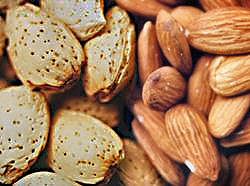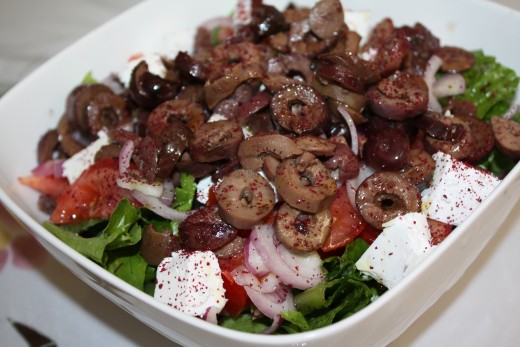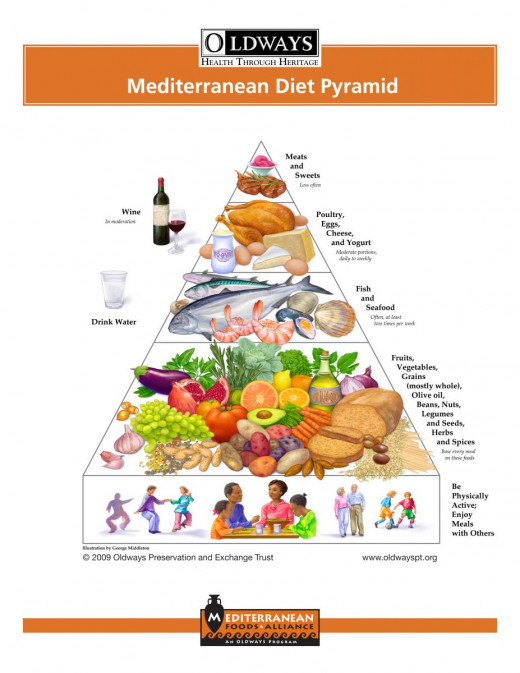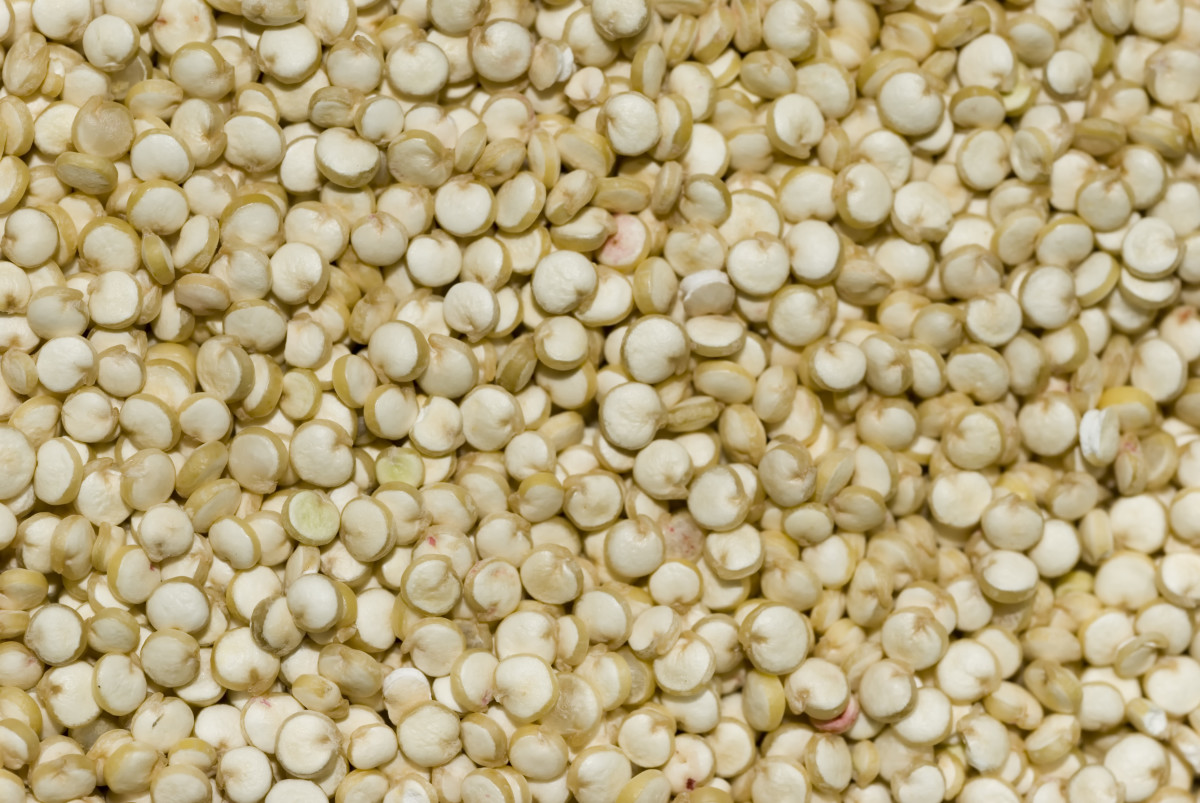Mediterranean Diet Promotes Heart Health and Diabetes Management
About the Author
As a health care professional for more than 30 years, I've always had an interest in nutrition. As a recently diagnosed type 2 diabetes, my interest in nutrition has become personal as well as professional. My doctor recommended following the Mediterranean style diet to gain improved control over blood sugar levels, thus began my quest to learn all I could about this eating style.
Mediterranean Diet: One of the Best Eating Styles for Your Health
The Western world has added much to the lives of others through science, culture and more, but in terms of nutrition--not so much. As other parts of the world adapt their eating styles to that of the Western world--chiefly the United States--the incidence of obesity, cardiovascular disease and metabolic syndrome has skyrocketed due to those adaptations.
Health experts recognized that the traditional diet/eating style of people living in Crete, Greece and southern Italy in the early 1960s promoted low levels of chronic health conditions and longevity in a part of the world where medical care was limited. In 1993, the Harvard School of Public Health, Oldways and the European Office of the World Health Organization introduced the Western world to the traditional Mediterranean pattern of eating in Cambridge, Mass.
Since that time, much study has been devoted to understanding and pinpointing the details of both the eating patterns and the lifestyle of this relatively small portion of the world that promotes health and longevity. Some of that study has proven through vigorous research that the food choices and lifestyle of the Mediterranean diet reduce the risk for cardiovascular disease. The American Heart Association promotes the Mediterranean diet and lifestyle as being heart-healthy--a significant endorsement by a valued health source.
This is but one example of how scientific study is demonstrating the health -- and life -- value of the Mediterranean diet.
Features of Mediterranean Style Diet



Mediterranean Diet Eating Pattern
The Mediterranean style diet advocates eating a diet rich in fruits and vegetables, beans, grains, nuts and seeds. Dairy in the form of yogurt or cheese is in the daily diet in low to moderate amounts. Fish, poultry and eggs replace red meat for the most part. This diet style is low in saturated fat, with most of the fat coming from olive oil and nuts. Daily physical activity is also part of the lifestyle.
If you're considering changing your eating habits to something healthier, the Mediterranean style diet's choices and patterns may fit the bill. Remember, you don't have to change everything at once. You can make diet and lifestyle adaptations gradually, perhaps by adding more fruits to your daily diet initially or switching from vegetable oil to olive oil for your cooking. As you begin to make healthier food and physical activity choices, you'll feel empowered to be in charge of your health.
If you're looking for authentic Mediterranean/Greek recipes, consider visiting Elena Paravantes' blog. Paravantes is a registered dietitian and a Greek-American. Her information will aid you in making changes in your eating style to a more Mediterranean style.
Mediterranean Food Pyramid

Mediterranean Diet Proven to Decrease Heart Disease Risk
In the largest research study done to date to determine the long-term outcomes for heart health as the result of following a specific type of diet/eating style, medical experts found that participants with high risk factors for heart disease responded favorably after following the Mediterranean diet for a median period of more than four years.
Over 7,000 people were involved in the study. To qualify as a participant, men had to be between the ages of 55 years to 80 years; women had to be between the ages of 60 years to 80 years.
None of the participants could have cardiovascular disease prior to the start of the trial and each had to have known high risk factors for the development of heart disease. Participants either had to have type 2 diabetes or three of these other high risk factors: overweight or obesity, be an active smoker, high blood pressure, have a family history of premature coronary artery disease, low HDL cholesterol level, high LDL cholesterol level.
The chosen participants were then randomly assigned to follow one of three diets: 1) The control diet, a low-fat diet 2) Mediterranean diet with added extra virgin olive oil or 3) Mediterranean diet with added nuts -- either walnuts, hazelnuts or almonds.
The Mediterranean diet with added extra virgin olive oil participants were directed to take in at least four tablespoons of the oil daily, while the participants following the Mediterranean diet with added tree nuts were directed to eat at least one-quarter cup per day of the supplied nuts.
Up until the results of this study, most research seemed to point in the direction of a low-fat diet to promote heart health. The results demonstrated in this study showed that what matters is the type of fat consumed; participants following the two Mediterranean diets exhibited a 30 percent reduction in heart attacks, strokes and death over the seven-year study period compared to those following the control diet.
The conclusion reached by the research is that following a Mediterranean style diet for people with high risk factors for heart disease resulted in a "substantial reduction in the risk of major cardiovascular events"* and should be considered a front-line tool in the prevention of heart disease in high-risk individuals.
* New England Journal of Medicine, "Primary Prevention of Cardiovascular Disease with a Mediterranean Diet," Feb. 25, 2013.
Recipe: Lemon Cilantro Shrimp Stir Fry
Recipe: Tabbouleh
Great Couscous Recipe
Mediterranean Diet: A Proven Weapon Against Metabolic Syndrome
Metabolic syndrome, also called insulin resistance syndrome, is a group of risk factors that predispose a person to the development of type 2 diabetes, stroke and coronary artery disease. With the rise of obesity in the United States and other countries where the typical American diet is followed has come a rise in metabolic syndrome and the chronic illnesses related to the syndrome's risk factors.
In an article published in the "American Journal of Clinical Nutrition" December 2009, a group of researchers from Tufts University in Boston, Massachusetts wrote that a Mediterranean style diet may protect against metabolic syndrome in Americans.
In a more recent study, a meta-analysis of 50 studies that included more than 500,000 study participants published March 2011 in the "Journal of American College of Cardiology" found that the classic Mediterranean pattern of eating reduced health factors associated with insulin resistance such as both systolic and diastolic blood pressure, waist circumference, and HDL and triglyceride levels, as well as decreasing the incidence of insulin resistance itself. The researchers concluded their published results with this statement: "These results are of considerable public health importance, because this dietary pattern can be easily adopted by all population groups and various cultures and cost-effectively serve for primary and secondary prevention of the MS and its individual components."
Research Correlates Mediterranean Diet with Liver Health
In a first of its kind study, researchers in Melbourne, Australia's St. Vincent's Hospital followed 12 study participants for six weeks, monitoring the effects of the Mediterranean diet versus the National Heart Foundation diet. Each of the study participants was verified to have non-alcoholic fatty liver disease via liver biopsy prior to the study.
After the six week period, participants who had followed the Mediterranean diet experienced a 39 percent decrease in liver fat; those following the heart diet had no significant change in liver fat. The Mediterranean diet also increased insulin sensitivity after the trial, an important factor in preventing the onset of type 2 diabetes.
Interestingly, the participants following the Mediterranean diet experienced these improvements even in the absence of weight loss.
In other research, scientists looked into the correlation between monounsaturated fats, particularly olive oil -- the major fat in the Mediterranean diet -- with non-alcoholic fatty liver disease. This disease, often associated with metabolic syndrome/insulin resistance, can develop into cirrhosis or fibrosis of the liver.
Researchers determined that olive oil's health benefits extended beyond it merely being a monounsaturated fat; its polyphenols also provide protection such as aiding in improved glycemic tolerance. Olive oil has also been determined to have anti-inflammatory and antioxidant properties. Finally, olive oil's principle benefits were noted to be its ability to decrease LDL oxidation and improvement of insulin resistance -- both important factors in preventing or reducing non-alcoholic fatty liver disease.
Classic Mediterranean Diet as a Diabetic Diet
The incidence of diabetes, especially type 2 diabetes, has increased nearly proportionately with the rate of overweight and obesity in the United States and elsewhere. Diet and nutrition are central in the control and management of this chronic illness.
The classic Mediterranean diet eating pattern was recommended to me by my health care provider three years ago when first diagnosed with type 2 diabetes. My own results have been positive, with improved blood sugar levels with fewer high and low spikes. But the results of any one individual is far from scientific proof, but fortunately there is research that suggests my experience is not unexpected.
In the Sept. 2009 "Annals of Internal Medicine," researchers compared the effects of a Mediterranean style diet with that of a low-fat diet on blood glucose control and the need for initiation of antihyperglycemic drug therapy as well as weight loss. More than 200 study participants who were overweight, diagnosed with type 2 diabetes and had never been prescribed anti-diabetic medication.
After four years, 44 percent of those who adhered to the Mediterranean style diet required prescription treatment for the diabetes compared with 70 percent of those who adhered to the low-fat diet. In addition, those who followed the Mediterranean diet also lost more weight and had some increased blood sugar control and improvement in coronary risk measures than their counterparts who followed the low-fat diet.
In Jan. 2013, "The American Journal of Clinical Nutrition" published results of a review and meta-analysis assessing the effect of various diets on blood sugar, glycemic, control, weight loss and lipid levels. Among the various diets studied for this comparison were the Mediterranean, vegetarian, vegan, low-carbohydrate, American Diabetes Association, European Association for the Study of Diabetes, low-protein and others.
The Mediterranean diet was the only one of those studied that not only improved glycemic control, improved weight loss and an increase in HDL cholesterol levels, gaining this eating style a recommendation for consideration of use in overall diabetic therapy.
Related Hubs
- The Mediterranean Diet: Heart Disease Effects
- Mediterranean Diet Plan for Long Life and Excellent Health
Find out about the Mediterranean diet plan and how it can help you live longer and healthier. You will certainly lose weight! Also learn how you can cut your risk for certain diseases following the Mediterranean diet. These simple diet tips can great - Why the buzz about Mediterranean diet?
Have you ever wonder why the people following the concepts of Mediterranean diet live longer? What is so special about the Mediterranean lifestyle and food that makes people enjoy a healthier and longer life?... - The Mediterranean Diet: Lower Rates Of Cancer
Olive oil and the Mediterranean diet are also associated with lower rates of cancer. There are many explanations for why this might be so and it seems that a phytochemical called squalene may provide yet...
Mediterranean Diet May Sustain Cognitive Function
A recent study performed at Rush University Medical Center looked into the dietary habits and cognitive function of almost 4,000 Midwesterners aged 65 and older. The study scored the participants on how well they followed the traditional Greek diet and another score for how well they adhered to the 2005 Dietary Guidelines for Americans.
The study, funded by the National Institute on Aging, re-tested study participants' cognitive functions and relation of scores for both the Mediterranean diet and U.S. dietary guidelines every 3 years, with an average follow-up time for each participant of more than seven years. The research team found that higher scores for adherence to the Mediterranean diet resulted in the smallest declines in cognitive function, while such scores on adherence to U.S. dietary guidelines did not. This suggests that the Mediterranean diet may be useful in slowing cognitive decline. Further studies will need to be done before definitive determinations can be made.
Update Oct. 7, 2012: Australia researchers, using data from the Australian Imaging, Biomarkers and Lifestyle Study of Ageing cohort, determined that the older adults who most closely adhered to the Mediterranean diet had significantly lower incidence of Alzheimer's disease and mild cognitive impairment.
Why can't scientists make up their collective mind as to whether the classic Mediterranean eating pattern aids in keeping or promoting cognitive function? Part of the dilemma is that all research conducted has not come to the same conclusions. For example, a French study published Jan. 2013 in "The American Journal of Clinical Nutrition" that followed over 3,000 study participants found no significant differences in the cognitive functions of those who followed the Mediterranean style diet than those who did not. For now, these results bring into question earlier research with different conclusions.
Additional Resources
Mediterranean Diet and Skin Cancer
The results of a study published in the peer-reviewed journal, Nutrition Reviews, discusses the potential that a diet rich in antioxidants and omega-3 fatty acids, as is the Mediterranean/Greek diet, may afford protection against the development of melanoma -- the most lethal form of skin cancer.
Dr. Niva Shapira noted the lower incidence rate of melanoma in the Greek as compared to other regions of the world with similarly sunny climates. Shapira notes that a diet rich in olive oil, fish, and fresh fruits and vegetables provides the antioxidant power to combat the oxidizing damage of the sun.
In June 2011, in "Cancer Letters," researchers identified carnosol, a substance present in many of the herbs used frequently in Mediterranean cooking such as rosemary, oregano, sage and parsley has been evaluated and found to be have anti-cancer properties in several types of cancer, including skin cancer. Further research will be needed to determine carnosol's value as a cancer protection agent and perhaps as a cancer treatment.
Sources
- Metabolic syndrome - PubMed Health
Metabolic syndrome is a name for a group of risk factors that occur together and increase the risk for coronary artery disease, stroke, and type 2 diabetes. - foodconsumer.org - Mediterranean diet linked to Alzheimer's disease, mild cognitive impairm
Mediterranean diet linked to reduced incidence Alzheimer's disease, mild cognitive impairment - Go back to the Med for your diet this month | The Triton
- Healthy Eating Pyramid - Your Nutrition Questions Answered - The Nutrition Source - Harvard School o
Healthy Eating Pyramid - Your Nutrition Questions Answered - The Nutrition Source - Harvard School of Public Health - The New Mediterranean Diet Pyramid - MayoClinic.com
The Mediterranean Diet Pyramid has been revised to reflect the latest research on healthy eating. - Mediterranean-style dietary pattern, reduced risk ... [Am J Clin Nutr. 2009] - PubMed result
American Journal of Clinical Nutrition; Mediterranean-style Dietary Pattern, Reduced Risk of Metabolic Syndrome Traits, and Incidence in the Framingham Offspring Cohort; ME Rumawas, et al; December 2009 - Adherence to a Mediterranean-type dietary pattern and cognitive decline in a community population









